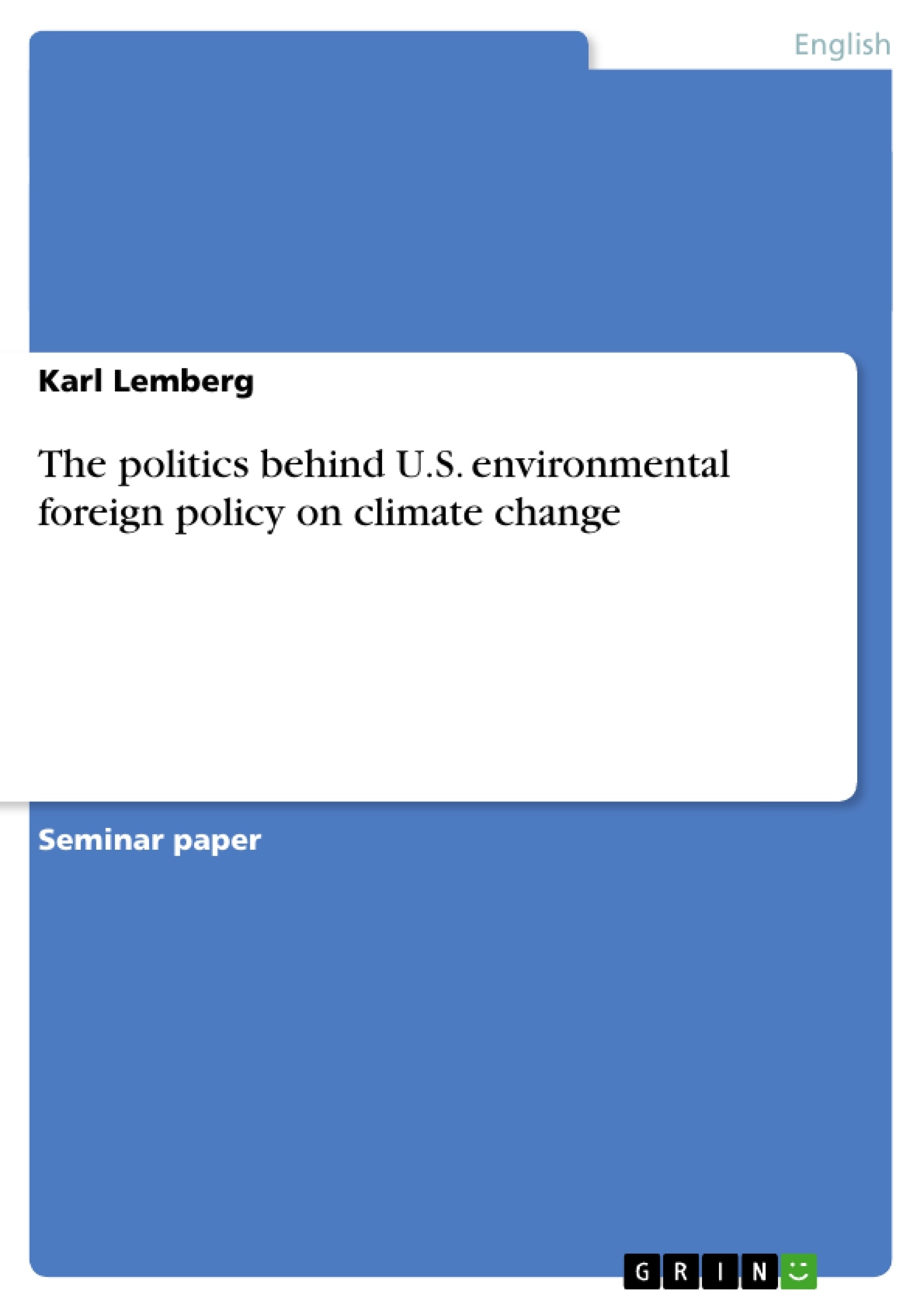Climate change is the extraordinary warming of the Earth from increased concentration of greenhouse gasses (GHG)1 and the climate consequences of that warming, which can be in many ways harmful to humans and the environment.2 In the 1980s climate change appeared on the agenda in international politics3 but only since the end of the Cold War the climate change debate has shifted into the focus of concern in foreign policy circles4 until it was swept away by an omnipresent War on Terror after September 11. The United States, as the world’s largest polluter5 to climate change – US emissions of CO² exceed those of all other countries6 plus on a per capita basis US CO²-emissions are the highest off all countries7 – plays a major, if not the decisive, role in international environmental politics and the dialogue for a global strategy to address climate change. While the United States was one of the leading countries in terms of progressive domestic legislation and one of the driving forces behind international environmental agreements (e.g. dealing with the problem of ozone depletion culminating in the Montreal Protocol) 8, the US is now not only blocking the Kyoto Protocol, but also actively pressuring other undecided countries not to sign and ratify the Protocol. Paradoxically, American scientists have played a leading role in identifying the anthropogenic affect on global warming and its dangerous consequences, yet political commitment and leadership to address the climate change problem is very weak.
American foreign policy especially with regards to climate change can only be explained by a myriad of factors, ranging from concerns for national interests and the influence of domestic politics, to the ability of exercising leadership.9 In the course of this paper I want to shed some light on the politics behind the U.S. climate change policy. The main questions will be: Who are the key players in the decision-making process and which groups influence the policy-shaping of these key players. In the end I will reflect my findings upon the U.S. politics around the Kyoto Protocol and compare the approach to climate change policy of former President Clinton with that of current President Bush. My primary non-academic source is a telephone interview with Daniel Chao – legislative director for Congresswomen Grace Napolitano (D-CA) in the US House of Representatives and key Democratic10 House staffer for environmental issues – conducted December 28, 2003.
Inhaltsverzeichnis (Table of Contents)
- Introduction
- Decision Makers
- President
- Congress
- Influencers
- Constituency
- Special Interest Groups
- Scientific Research/Economic Advisors
- Public Opinion
- Conclusion I - Reflection
- Kyoto Protocol
- From Clinton to Bush
- Conclusion II - The Influence of Domestic Politics in International Environmental Politics
Zielsetzung und Themenschwerpunkte (Objectives and Key Themes)
This paper aims to analyze the politics behind the U.S. environmental foreign policy on climate change. It explores the key players in the decision-making process and investigates the influential groups that shape their policies. The paper also reflects upon the U.S. approach to the Kyoto Protocol and compares the climate change policies of President Clinton and President Bush.
- Decision-making process for climate change policy
- Influence of domestic politics on U.S. environmental foreign policy
- Role of the President and Congress
- The U.S. stance on the Kyoto Protocol
- Comparison of Clinton and Bush administrations on climate change policy
Zusammenfassung der Kapitel (Chapter Summaries)
The introduction outlines the issue of climate change and its global consequences. It emphasizes the United States' significant role as the world's largest polluter and its contradictory stance on international environmental agreements. The paper aims to uncover the political factors behind this inconsistency.
The chapter "Decision Makers" examines the roles of the President and Congress in shaping climate change policy. It highlights the presidential dominance in foreign policy but also points out the unique nature of climate change, which necessitates congressional involvement due to its domestic implications.
The chapter "Influencers" delves into the various groups that influence decision-makers on climate change, including the constituency, special interest groups, scientific research and economic advisors, and public opinion. It explores the complex interplay of these factors and their impact on policy formation.
Schlüsselwörter (Keywords)
Climate change, environmental foreign policy, United States, Kyoto Protocol, decision-makers, influencers, domestic politics, international environmental politics, President, Congress, constituency, special interest groups, scientific research, economic advisors, public opinion, Clinton, Bush.
Frequently Asked Questions
Why did the US withdraw from the Kyoto Protocol?
The withdrawal was driven by concerns for national economic interests, the influence of domestic special interest groups, and a lack of political consensus in Congress.
Who are the key decision-makers in US climate policy?
The President and Congress are the primary players, though their decisions are heavily influenced by scientific advisors, economic interest groups, and public opinion.
How did Clinton and Bush differ on climate change?
While Clinton supported international agreements like Kyoto, Bush took a more skeptical approach, prioritizing domestic economic growth over international environmental commitments.
What is the role of special interest groups in environmental policy?
Groups representing the energy and manufacturing sectors often lobby against strict climate regulations to protect their industries from increased costs.
Does public opinion affect US foreign environmental policy?
Yes, though its influence varies. Politicians are sensitive to the concerns of their constituency, particularly regarding energy prices and job security.
- Citar trabajo
- Karl Lemberg (Autor), 2004, The politics behind U.S. environmental foreign policy on climate change, Múnich, GRIN Verlag, https://www.grin.com/document/45860



